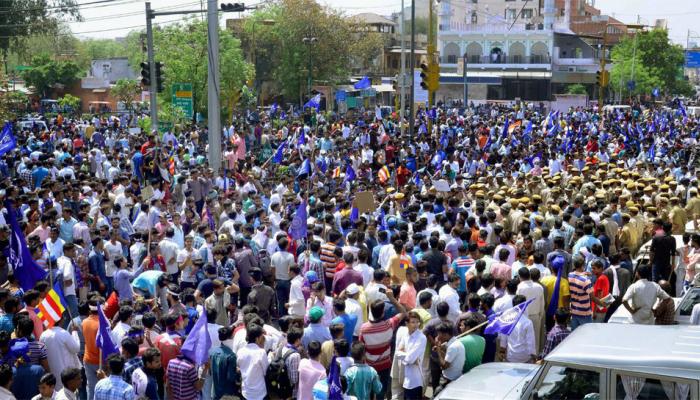Note: READ is our New Initiative to cover two Topics (Weekly) of Current Importance in Detail with Specific focus on Prelims and Mains Exam
our New Initiative to cover two Topics (Weekly) of Current Importance in Detail with Specific focus on Prelims and Mains Exam
The issue of Schedule caste / Scheduled Tribe act
- In March 2018, the Supreme Court observed that the SC/ST (Prevention of Atrocities) Act of 1989 has become an instrument to “blackmail” innocent citizens and public servants.
- The Supreme Court’s decision to issue guidelines to check the abuse of the Scheduled Castes and Scheduled Tribes (Prevention of Atrocities) Act, 1989, has raised many eyebrows with several political parties and Dalit activists demanding its review. The apex court ordered that under the Act, a public servant can be arrested after approval of the appointing authority and a non-public servant only after a sanction by the Senior Superintendent of Police. It opened a window of anticipatory bail and a way to ascertain whether complaints against the accused were frivolous or motivated.
- In India, SCs and STs have suffered social ostracisation and economic deprivation for centuries. To address this social deficit and achieve the “dignity of the individual” was set out as one of the objectives in the Preamble to the Constitution. Article 17 abolished untouchability and made it “an offence punishable in accordance with law”. Despite laws, the abhorrent practice of discrimination and violence against the SCs and STs continues.
- Statistics show that the conviction rate under the Act is low and the less-than-enthusiastic pursuit of investigation and prosecution reflects in the disposal of cases by courts. On the other hand, most result in acquittal/withdrawal or compounding of most cases against the accused too.
The Scheduled Castes and the Scheduled Tribes (Prevention of Atrocities) Act, 1989
It was enacted to:
- Prevent the commission of offences of atrocities against the members of the Scheduled Castes and Scheduled Tribes
- establish Special Courts for the trial of such offences and
- Provide relief and rehabilitation of the victims of such offences.
- Despite the deterrent provisions made in the Act, atrocities against the members of the Scheduled Castes and Scheduled Tribes continues at a disturbing level.
- The act also didn’t cover certain forms of atrocities, known to be occurring in recent years.
- The implementation of the Act also suffered due to (a) procedural hurdles such as non-registration of cases; (b) procedural delays in investigation, arrests and filing of charge-sheets; and (c) delays in trial and low conviction rate.
In this background, the above act was amended in 2015-
The Scheduled Castes and the Scheduled Tribes (Prevention of Atrocities) Amendment Act, 2015
- New offences of atrocities:It adds new categories of actions to be treated as offences such as garlanding with footwear, compelling to do manual scavenging, imposing or threatening a social or economic boycott.
- Speedy disposal: Exclusive Special Courts to be established along with the specification of Exclusive Special Public Prosecutors to ensure completion of the trial of the case within two months, from the date of filing of the charge sheet.
- Addition of presumption to the offences:If the accused was acquainted with the victim or his family, the court will presume that the accused was aware of the caste or tribal identity of the victim unless proved otherwise.
- Wilful negligence:it clearly defines the term ‘wilful negligence’ of public servants at all levels, starting from the registration of complaint, and covering aspects of dereliction of duty under this Act.
Rights of victims and witnesses:
- The Bill adds a chapter on the rights of victims and witness.
- It shall be the duty of the state to make arrangements for the protection of victims, their dependents and witnesses.
- The state government shall specify a scheme to ensure the implementation of rights of victims and witnesses.
NCRB Data 2017
- The NCRB data of crimes against SC/ST (PoA) Act, as revealed in its 2017 annual report, reveals that while in 2014 the number of cases were 40,401, they had dropped marginally by 4.3% to 38,670 in 2015, but had risen by 5.5% to reach 40,801 in 2016.
- In 2016, Uttar Pradesh (10,426 cases) reported the highest number of cases of atrocities against SCs accounting for 25.6% of the total followed by Bihar with 14.0% and Rajasthan with 12.6% during 2016.
- The largest proportion of these cases was of assault on women with intent to outrage her modesty at 7.7% (3172 cases) followed by rape at 6.2% (2,541 cases).
- In the case of STs, the number of cases stood at 6,827 in 2014, fell by 8.1% to reach 6,276 in 2015, and then rose by 4.7% to 6,568 in 2016.
- In the case of STs, Madhya Pradesh (1,823 cases) reported the highest number of cases of atrocities at 27.8% followed by Rajasthan (18.2%) and Odisha (10.4%).
- In the case of STs, there were 974 rape cases which constituted 14.8% of all crime against them.
- The disposal of cases by police and courts revealed that under the Act, 1989, 11,060 cases were taken up for investigation in 2016 and the charge-sheeting rate was 77%.
- In 2016, there were 45,233 cases pending trial from the previous year under the 1989 Act whereas 5124 were sent for trial during the year resulting in a total of 50,357 cases during the year.
- Final reports submitted by the police during the year revealed that the police had found 2150 cases to be “true but (with) insufficient evidence”, 5,347 cases to be “false”, and 869 cases to be “mistake of fact”.
- HPSC Mains Tests and Notes Program 2025
- HPSC Prelims Exam 2025- Test Series and Notes Program
- HPSC Prelims and Mains Tests Series and Notes Program 2025
- HPSC Detailed Complete Prelims Notes 2025